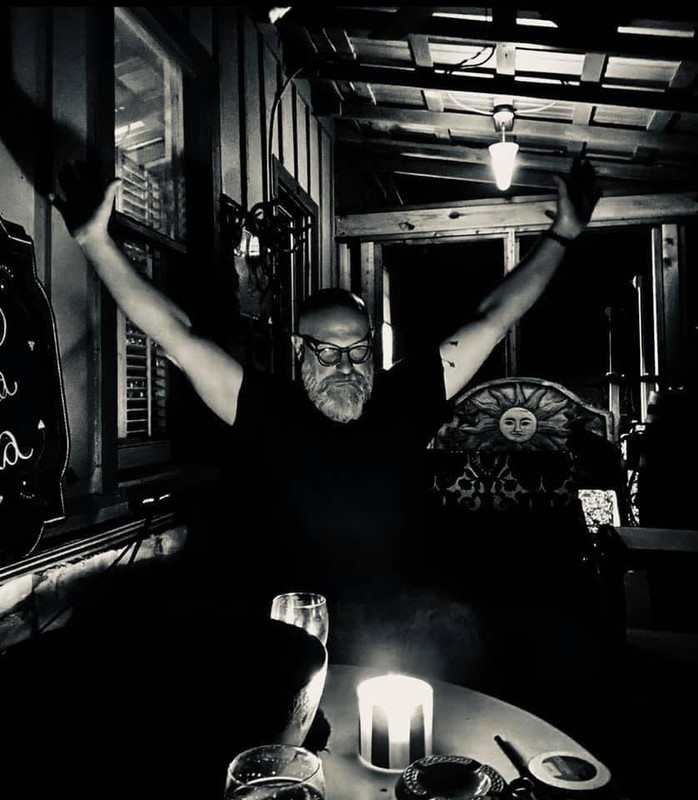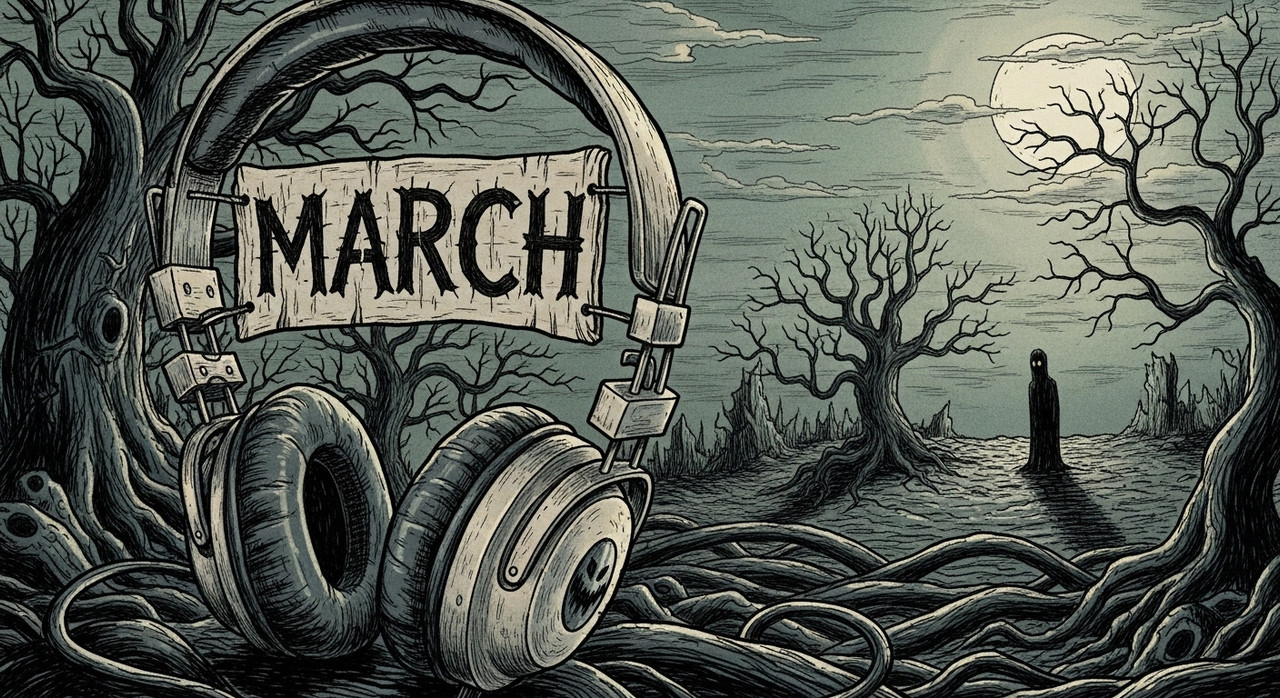
https://www.facebook.com/blackrachis
Sounds like: Rock
From: Texas
1. How did you get started with music and how did you develop your sound? How did the name "Black Rachis" come about and is there any meaning to it?
I’ve been intimately connected to music my entire life. My parents were both public school educators, and my dad, while holding a degree in education, also minored in music. He taught me “Do-Re-Mi” on the piano when I was just a toddler. He was a trained vocalist and even performed opera in college. My mom played piano, so naturally, they put me in lessons starting at age 7. I took years of piano lessons—probably too many for how poorly I still get around the keyboard—but they also let me tinker with our old upright. I’ve always been fascinated by its inner workings. My wife and I are visual artists too, and we’ve repurposed several old pianos for our art projects.
Growing up, we were also active in a traditional evangelical church. My dad led the youth choir and sometimes acted as Minister of Music, leading revival-style gatherings around Central Texas. We sang as a family and as a congregation. That kind of group singing is a lost art today—unless you go to church, you probably don’t experience it much anymore.
In 6th grade—1974—my dad took a teacher exchange gig in Terang, Victoria, Australia. We lived there for the entire year of 1975. While he taught 6th grade, I attended Form 1 at the local high school and took my first guitar lessons. I also took snare drum lessons at the Presbyterian Church from older pipe-and-drum band members—serious old-school dudes who insisted “The drums are the only instrument that can accompany bagpipes.” I knew that wasn’t true.
Later that week, everything changed. I was watching a pop music show on Australia’s black-and-white TV channel called COUNTDOWN when AC/DC came on, performing “It’s a Long Way to the Top (If You Wanna Rock & Roll).” There was Bon Scott—playing the bagpipes. I was floored. I went back to church drum class and told the old man he was wrong.
That moment, paired with guitar lessons and discovering AC/DC, supercharged my passion. By 8th grade, I had my first band—NASSAU. We won the school talent show playing “Rock Bottom” by KISS, then did half of “Parasite” and kept looping the only parts we knew of it as an encore because we didn’t know the whole thing. But the crowd went nuts. As I played the intro solo, I was so focused I didn’t even hear the rest of the band come in—until I looked up and the whole gym was on its feet, screaming and dancing right in our faces. It felt like those old Beatles fan scenes on TV. I was hooked. I’ve been chasing that adrenaline rush ever since.
We were proto-punks without knowing it. We thought we were hardcore because we were listening to Sabbath, Tull, Nazareth, Bowie, Iggy Pop, Rush, Yes, ZZ Top (Texas, after all), and KISS—while nobody in our town had even heard of AC/DC, despite my evangelism and my imported High Voltage record. But the summer of 1978 changed everything again when my drummer brought back Ramones – Rocket to Russia and Sex Pistols – Never Mind the Bollocks vinyl albums purchased and smuggled in from Austin. And suddenly Arena Rock lost some of its glam and glitter replaced with snotty punk snarl.
So my Sound evolved out of the 70s scene with lots of traditional choral elements. My guitar sound is a hybrid of analog and digital reflecting my roots. Life took a detour as I took on family responsibilities early on, but now I’m back and focused on my music—my art.
“Rachis” is a botanical term—it refers to the main stem of a plant or flower, especially the pistil. I’ll admit: it’s a $500 word when a $5 word might’ve done the job. But as a songwriter, sometimes I can’t resist the deeper cut. The unfortunate reality is that most people aren’t familiar with that vocabulary. Lesson learned: communication matters more than cleverness.
Black Rachis & The Dance of The Dominant Dogs is my latest release—a rock opera set in the high desert of the American West. It’s a fusion of primal punk, metal, and classical composition. Think Prog + Punk = ¡Pränk!—but it’s a Bloody Serious ¡Pränk! All the Same! There’s a formal overture, a libretto available on Bandcamp, symphonic arrangements, and a piano-driven finale that closes the album with grit and polish. It’s ambitious, vocally forward, and 100% intentional.
Other projects I’m involved in: The Dearly Belated, Skull Shaker, Envoy and of course, Dru Landrum – solo.
2. What do you want people to take away from your music?
I want listeners to feel something—not just hear it. I want my audience to be part of the experience, not passive spectators. Music is a participatory art. It doesn’t exist in a vacuum—it requires resonance, and that resonance comes from connection. That’s the magic I try to share.
3. How would you describe your sound to the average listener?
Adult-Oriented Prog Rock with a strong conceptual backbone. Black Rachis & The Dance of the Dominant Dogs is a full concept album with rock & roll grit, layered vocals, and symphonic arrangement. It’s both dramatic and grounded—ambitious but accessible. A Western Rock Opera for those who crave something bold.
4. Who are three bands you’d like to tour with?
Muse, Queens of the Stone Age, and The Damned.
5. What's your thoughts on AI generated music?
Every technological advance floods the market with copycats. AI will make it easier for less-skilled folks to produce technically competent work, but the soul of the music can get lost. Quantity will increase. Quality? Not so much. Mimicry isn’t art. Screaming isn’t expression—unless you mean it. It’ll take a generation to learn how to discern genuine AI insight and artistic composition from slick, mass-marketed mediocrity.
6. What’s your take on the current state of Rock?
Alive and well—in Austin, Texas. Everywhere else? Kinda sus.
7. What’s the current music scene like there in Texas?
It’s massive and fiercely competitive. Being in a band here is cliché—everyone’s doing it. You can’t swing a dead cat without hitting five guitarists. But the upside? The scene’s depth means there’s gold in the mix. You just have to wade through a lot of “pretty good” to find the truly great. And when you do—it’s magic. Everything’s bigger in Texas, especially our music scene.
8. What’s your take on the royalties that streaming services pay out to artists?
It’s a big rip-off for artists. Prove me wrong.
9. What’s next for Black Rachis?
Live stage performance. This project was born in the isolation of COVID, and now it’s time to bring it to life. I’m looking for players to gig it out and a choreographer to help develop the theatrical staging. Meanwhile, I’m performing solo arrangements to keep it moving forward.
10. Any shoutouts?
Huge thanks to my collaborator Joules (Yellowbrick Roadrash) and Alex Campbell, aka Sash Irony—couldn’t have done it without you.

